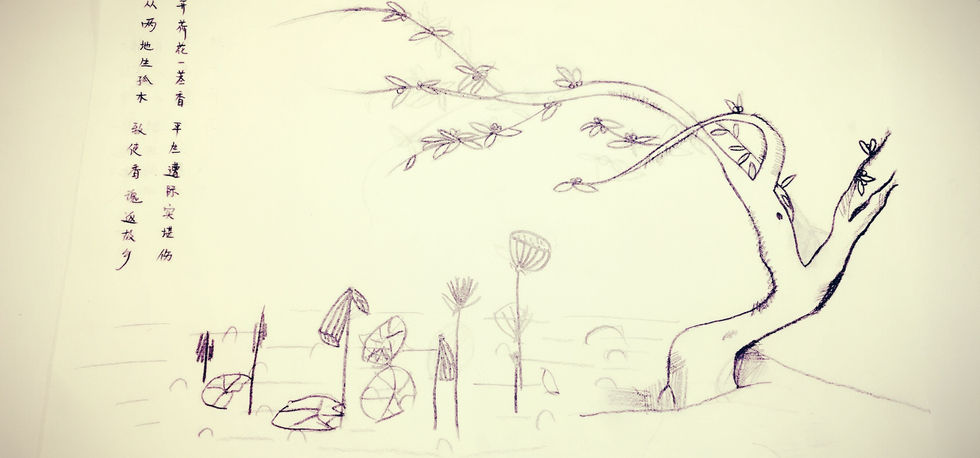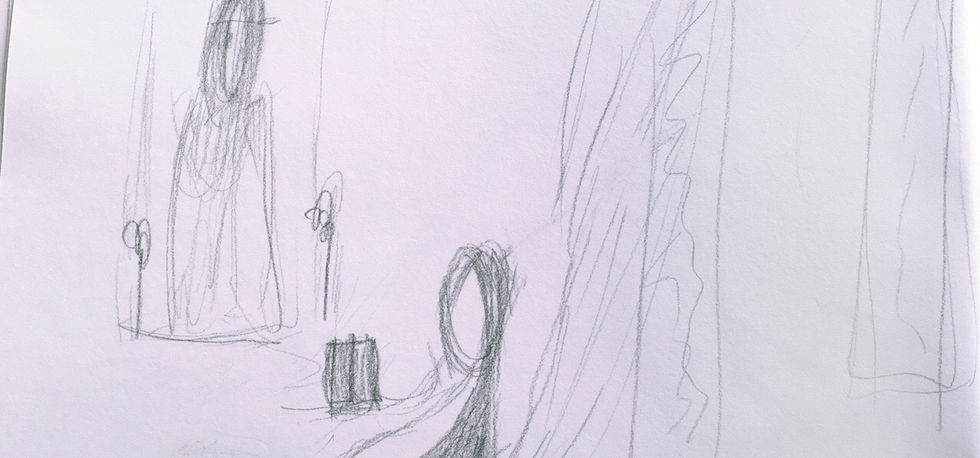Rosa
龄官画蔷痴及局外
Object type:
Installation
Subject:
Sculpture
Material:
Clay,
Cucomber Cream
Date:
12/11/2018
In 30th Chapter of the Dream of Red Chamber, Baoyu (the only inheritor in Jia's big family) saw a girl painting the word "蔷" on the ground, even if it rained. The girl's name is LingGuan(龄官),she is a traditional Chinese opera actress in the manor of Jia which belongs to Baoyu's family. Baoyu once asked her to sing a song but been refused, he also witnessed the scene of dalliance between she and Qiang (蔷).
Baoyu gradually understood the meaning of "蔷" -- the word she painted is his brother‘s name and now she use this method to express the affection for him in a secret and private way. Baoyu realized that not all the tears from girls are followed for him, and everyone could only get the tears of a special person of each.
Context Introduction:
Dream of the Red Chamber, also called The Story of the Stone, composed by Cao Xueqin, is one of China's Four Great Classical Novels. It was written sometime in the middle of the 18th century during the Qing dynasty. Long considered a masterpiece of Chinese literature, the novel is generally acknowledged to be the pinnacle of Chinese fiction.[1] "Redology" is the field of study devoted exclusively to this work.[2]
The title has also been translated as Red Chamber Dream and A Dream of Red Mansions. The novel circulated in manuscript copies with various titles until its print publication, in 1791. Gao E, who prepared the first and second printed editions with his partner Cheng Weiyuan in 1791–92, added 40 additional chapters to complete the novel.[3]
Red Chamber is believed to be semi-autobiographical, mirroring the rise and decline of author Cao Xueqin's own family and, by extension, of the Qing Dynasty.[4] As the author details in the first chapter, it is intended to be a memorial to the damsels he knew in his youth: friends, relatives and servants. The novel is remarkable not only for its huge cast of characters and psychological scope, but also for its precise and detailed observation of the life and social structures typical of 18th-century Chinese society.[5]
References:
-
"From West to East: Conservation of the Chinese novel 'Dream of the Red Chamber'". British Library.
-
Jump up ^ Jonathan Spence, The Search for Modern China (New York: Norton, 1990), 106–110.
-
^ Jump up to: a b David Hawkes, "Introduction," The Story of the StoneVolume I (Penguin Books, 1973), pp. 15–19.
-
Jump up ^ Jonathan D. Spence, Ts'ao Yin [Cao Yin] and the K'ang-Hsi Emperor: Bondservant and Master (New Haven,: Yale University Press, 1966) is a study of Cao's grandfather.
-
Jump up ^ "CliffsNotes, About the Novel: Introduction". Cliffsnotes.com. Retrieved 2017-11-02.
Context Character Introduction:
Jia Baoyu (simplified Chinese: 贾宝玉,Meaning: Precious Jade)
The main protagonist is about 12 or 13 years old when introduced in the novel. Born with a piece of luminescent jade in his mouth (the Stone), Baoyu is the heir apparent to the Rongguo House. Frowned on by his strict Confucian father, Baoyu reads Zhuangzi and Romance of the Western Chamber on the sly, rather than the Four Books of classic Chinese education. Baoyu is highly intelligent, but dislikes the fawning bureaucrats that frequent his father's house. A sensitive and compassionate individual, he has a special relationship with many of the women in the house.

LingGuan 龄官
Oil on canvas
12“x12” inches
Date:19/10/2018
As mentioned above, in 30th Chapter of the Dream of Red Chamber, Baoyu (the only inheritor in Jia's big family) saw a girl painting the word "蔷" on the ground, even if it rained. The girl's name is LingGuan(龄官),she is a traditional Chinese opera actress in the manor of Jia which belongs to Baoyu's family. Baoyu once asked her to sing a song but been refused, he also witnessed the scene of dalliance between she and Qiang (蔷).
So the Girl on the painting is exactly the one who painted the word "蔷" again and again, using this secret way of writing lover's name unconsciously to express love.










